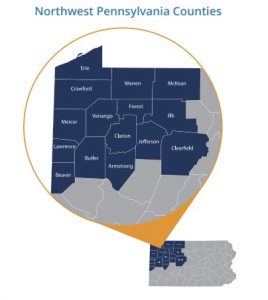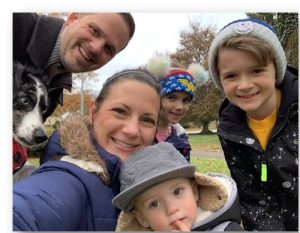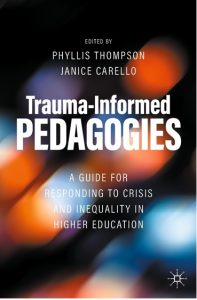Not a Hero and Not a Stranger: Serving Veterans in Higher Education

The Northwest Pennsylvania (NW PA) Veteran Suicide Prevention Program operates on a three-pronged approach involving healthcare providers, community organizations, and Veterans and their families in the 15 counties of NW PA. The “Person-First” series chronicles the lived experiences of Veterans committed to reducing suicide deaths of those who have served in the armed forces. In this article, Jay Breneman, Ph.D., speaks of his eight years serving in the US Army and the reintegration challenges faced as a non-traditional college student . These experiences led him to pursue a career in social work and higher education, with a primary emphasis on Veteran services.
In addition to Jay’s story, the NW PA Veteran Suicide Prevention Program featured his recently published article, Not a Hero and Not a Stranger: Serving Veterans in Higher Education. In: Thompson, P., Carello, J. (eds) Trauma-Informed Pedagogies. Palgrave Macmillan, Cham. as part of the Program’s monthly journal club. A re-cap of this article and Jay’s presentation are available to download.
Read time: 10 minutes
Finding Purpose in the Desire to Enlist
 Today, Jay Brennan is a resident of Erie County and an Army Veteran. He’s also a husband, father, and full-time instructor and field director for the Master of Social Work program at PennWest, the second-largest university in Pennsylvania. Much of where Jay finds himself today can be traced back to the terror attacks of September 11, 2001, when at age 18, he called a US Army recruiter and began a nearly year-long journey to become a soldier. Having left high school before graduation and “wandering aimlessly,” he found purpose in the desire to enlist and enrolled in 6-months of GED courses, and participated in pre-enlistment training, evaluations, and activities. As a result of those efforts, he served for 6 ½ years across two enlistments, including three years overseas, with a year in South Korea and 2½ years deployed to Iraq.
Today, Jay Brennan is a resident of Erie County and an Army Veteran. He’s also a husband, father, and full-time instructor and field director for the Master of Social Work program at PennWest, the second-largest university in Pennsylvania. Much of where Jay finds himself today can be traced back to the terror attacks of September 11, 2001, when at age 18, he called a US Army recruiter and began a nearly year-long journey to become a soldier. Having left high school before graduation and “wandering aimlessly,” he found purpose in the desire to enlist and enrolled in 6-months of GED courses, and participated in pre-enlistment training, evaluations, and activities. As a result of those efforts, he served for 6 ½ years across two enlistments, including three years overseas, with a year in South Korea and 2½ years deployed to Iraq.
“I had a successful military career and achieved much more than I thought possible when I swore my first oath. But when I wasn’t deployed or in training, I frequently experienced jarring interactions with civilians who regarded me as some sort of hero who needed a hug, a free beer, cash in my hand, and thankful handshakes or backslaps.”
Even though he was honorably discharged in 2009, Jay struggled to respond to those interactions—which often felt transactional. “My choice for military service was not for the glory or greatness but for that essential Army value of selfless service. If I was a hero— which I most certainly was not—what does that make those who came back injured or who were killed in action for the sake of others?” These questions would guide him into a decade of inquiry, research, and direct work supporting Veterans on college campuses.
Enrolling in college classes just two weeks after his discharge, Jay brought life experience to the classroom and campus that was considerably different from those of his peers. “I was a student Veteran at a time when Veteran benefits were changing, universities were trying to figure out how to serve a growing number of student Veterans, and when the Department of Veterans Affairs was under scrutiny for delaying or denying benefits to student Veterans.”
These challenges fueled his career path. After earning his undergraduate and graduate degrees in social work, he served as the first Veterans coordinator for a small private college and later as the Veterans coordinator for a larger public university.
 Military Veterans face many of the same integration barriers as non-traditional college students while simultaneously encountering problematic and contradictory societal expectations and stigma around perceptions of heroism and trauma. “In my coordinator roles, my first goal was to convince the administration that we needed to do more than process benefits or refer student Veterans to healthcare services and that we should meet them with more than symbols and events of patriotism and gratitude.”
Military Veterans face many of the same integration barriers as non-traditional college students while simultaneously encountering problematic and contradictory societal expectations and stigma around perceptions of heroism and trauma. “In my coordinator roles, my first goal was to convince the administration that we needed to do more than process benefits or refer student Veterans to healthcare services and that we should meet them with more than symbols and events of patriotism and gratitude.”
These experiences prompted Jay to begin a Doctor of Social Work program at the University of Southern California, which he will complete in May of 2023. His chapter in Trauma-Informed Pedagogies is a result of his research and inquiry into the issues of higher education and Veteran reintegration. The following section explores the internalized and externalized pressures that student Veterans may face on a college campus and includes perspectives that educators and administrators can integrate into their practices and policies.
Not a Hero and Not a Stranger: Serving Veterans in Higher Education
From Trauma-Informed Pedagogies: A Guide for Responding to Crisis and Inequality in Higher Education
What is a trauma-informed approach?
- A trauma-informed approach realizes the widespread impact of trauma and understands potential paths for recovery; recognizes the signs and symptoms of trauma in clients, families, staff, and others involved with the system; and responds by fully integrating knowledge about trauma into policies, procedures, and practices, and seeks to resist re-traumatization.
Veterans: A Community of Identity in Transition
- The Veteran community originates with the shared experience of serving in the Armed Forces and varies considerably thereafter.
- This Veteran community shares one other common experience: transition and reintegration to civilian society upon completion of their duty
- This transition experience shapes both the externalized and internalized identity and the well-being of the Veteran
- Veterans may simultaneously encounter problematic—and even contradictory—societal expectations and stigma around perceptions of heroism and trauma
Modern Presence of Veterans in Higher Education
- Veterans experience a loss or thinning out of their community with reintegration into civilian society.
- Student Veterans must rebuild or bridge social and other capitals as part of reintegration.
- However, they will most likely be offered transactional solutions, such as benefits counseling.
- Student Veterans and educators need more of a connection to one another to recognize that reintegration is a shared journey
Three Challenges Student Veterans Experience on College Campuses and the Trauma-Informed Approaches to Overcome
- Unfair and unrealistic portrayals (such as a broken hero) and past-oriented stereotypes.
Develop a community focusing on similarities through shared physical and social environments. This includes limiting the practice of segregating Veterans or overemphasizing symbology of militarism and armed conflict. Engagement, such as events and programming, should be informed by cultural humility principles.
- Over-connection with the past at the detriment of the future.
Student Veterans may be encouraged or feel obliged to stick to academic programs or social events aligned with their military experience, thus becoming alienated from the broader campus environment. Instead, campuses can support a more holistic transition and exploration of skills, interests, and career paths beyond former military experiences.
- Loss of community capital and connections.
Student Veterans experience a loss of military community capital as they reintegrate into civilian life. Therefore, creating meaningful opportunities to build new connections including social networks and support structures, and developing community membership and engagement are vital to persistence in education and long-term success.
Changing Campus Culture to Strengthen Community
Jay acknowledges that shifts in campus culture take time and require internal champions aware of the many ways student Veterans contribute to classroom and campus diversity. “Ideally, it’s about building a learning environment that is responsive to the strengths and interests of their student Veterans. When we think beyond Veteran-only campus organizations and include integrated pathways to civic service, wellness and recreation, housing, and family-oriented opportunities, we build new opportunities that strengthen student Veterans and the entire campus community.”
Looking to Get Involved?
 Whether you identify as a healthcare provider, community organization, or Veteran, there are several opportunities through the NW PA Veteran Suicide Prevention Program and PERU to connect to resources, participate in educational training, and promote harm reduction strategies. We are actively recruiting healthcare and community partners to work with us in meeting our goals and objectives. To learn more, visit the program website at theresilientveteran.org.
Whether you identify as a healthcare provider, community organization, or Veteran, there are several opportunities through the NW PA Veteran Suicide Prevention Program and PERU to connect to resources, participate in educational training, and promote harm reduction strategies. We are actively recruiting healthcare and community partners to work with us in meeting our goals and objectives. To learn more, visit the program website at theresilientveteran.org.
Need Help? Know Someone Who Does? Contact the National Suicide Prevention Lifeline at 988 or use the online Lifeline Crisis Chat. Both are free and confidential. You’ll be connected to a skilled, trained counselor in your area.

